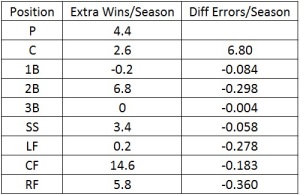Recently we examined the impact at a team level of fielding, finding that, with everything else being equal, fielding can have a huge impact on a team’s win total. This is true even at fielding levels comparable to what we see in MLB.
It only follows to take it a step further and do the same thing at a positional level. Of course a slick-fielding shortstop should be more valuable than other positions (again, all else being equal).
So we followed a similar methodology as we did in our team-level analysis, except that we used only two teams: a control team and an experimental team. Again using OOTP 16, we built both teams by making clones of one player and one pitcher with average ratings – including average fielding ratings. We then modified one positional player on the experimental team and optimized their relevant fielding ratings, and only gave them experience in the position of interest to keep the AI manager from using them in different positions. Player development and injuries were turned off.
We then simmed five 162-game seasons to see what benefit having the optimized fielder had on the team’s chances of winning, and tracked the fielding stats for each.
Below is the impact on a team’s win total based on those five seasons. Granted there is some noise in the data (we could sim it 1000 times per position to reduce the noise, but hey, we’re not getting paid for this). Also, it turns out the single position player we cloned was a lefty, and all pitchers were righties, so there is a strong bias towards position players on the right side of the diamond. Again, we could correct for this if someone wanted to pay us.
The glaring finding is the importance of a superior defending center fielder. The ability to get to balls in the gap to take away extra base hits turns out to provide more than twice as many extra wins per 162 games as any other position.
The other finding is that with the exception of catchers, all superior fielders had MORE errors per season than their average fielding counterparts. The logic being the got to more balls in play and therefore had more opportunities for errors.
Again this is only looking at the benefit of a great fielder compared to an average one. It would be different to look at a situation like Yasmany Tomas and the D’backs decision to put his less-than-stellar defense in at third, and the impact of a terrible fielder on team wins.


Am I misunderstanding this? I find it hard to believe that a great centerfielder adds 14+ wins to a team when compared to a mediocre centerfielder.
I could believe that a great centerfielder is worth 14 wins or more when compared to having no centerfielder at all.
Then, again all of the defensive metrics I’ve studied indicates even that may be overstating things.
And how can a superior third baseman, someone who robs doubles from the opposition, not account for any extra wins?
I wonder if this study really emphasizes the flaws in the sim.
Hi Ron, thanks for visiting and for the feedback.
You have to remember that outside of the fielding ability of that one particular fielder, all players were exact clones of each other. So any difference between the two would result in big differences in the win column.
For center fielders the biggest impact is in limiting doubles and triples in the gaps by catching them or cutting them off. 2b and 3b have high run expectancy so that single event can take a few runs off the board.
As for the 3rd baseman, as I mentioned the hitters were lefties so there were WAY more balls hit to the right side of the infield than to the 3rd base side. The 1b win effect is probably more representative of the third baseman.